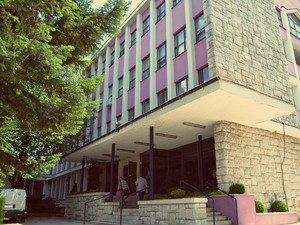 The latest official data analyzed by MANS Investigation Centre show that last year Montenegrin Electric Enterprise (EPCG) reduced capital investments for a whole €11 million, whereas it increased the amount of money kept in banks to €164.4 million, which is almost €36 million more in comparison to 2013.
The latest official data analyzed by MANS Investigation Centre show that last year Montenegrin Electric Enterprise (EPCG) reduced capital investments for a whole €11 million, whereas it increased the amount of money kept in banks to €164.4 million, which is almost €36 million more in comparison to 2013.
According to the financial statements and realized investments in 2014, EPCG invested €4.6 million less than planned in the development of the electricity distribution network, whereas the major share of the money was directed towards further realization of the project regarding installation of so called smart meters, for which a total of around €38 million was spent over the course of the last three years. It is important to emphasize that EPCG secured an international loan for this project, which means that consumers repay it through their electricity bills, despite the fact that EPCG owns the money that could be invested.
Last year, only €1.5 million was invested in the electricity distribution network, on which the electricity supply depends, so there is no wonder that there are frequent power outages and blackouts. A huge rate of electricity transmission and distribution losses, which was 17.6% at the end of the last year, is indicative of the poor condition of the network.
We remind that the capital of EPCG has increased for the purpose of the alleged infrastructure modernization, and the Italian partner A2A has been bound by the agreement stipulating that by the end of 2014 it will have been reduced to around 11%. To which extent EPCG was making efforts to reduce the electricity transmission and distribution losses shows the fact that during 2010 the rate was 19.9%, while €99 million was kept in private banks, instead of being invested in minimizing the loss.
When it comes to investing into plant maintenance and modernization, EPCG showed that only €4.7 million was invested instead of the original sum of €8.8 million. The company invested €2.5 million in hydropower plants Piva and Perućica instead of the planned €5.5 million, whereas €2 million was invested in the thermal power plant Pljevlja, which is one million less than envisaged for the previous year.
On the other hand, instead of investing in modernization of the company, EPCG continued to hoard money in banks, thus reaching the sum of €164.4 million at the end of last year, out of which time-deposit (for a specified term of three months to one year) was increased from €101 million in 2013 to €127 million in 2014.
EPCG introduced the policy of keeping money in private banks in 2009, when a strategic partner A2A increased the capital, intending to invest in renewal of the distribution network. Yet, a major share of money was pumped into Prva banka Crne Gore for the purpose of maintaining its liquidity, thus saving the bank owned by the prime minister’s brother from the threat of bankruptcy.
During 2009 EPCG kept €95.5 million in banks, €84.4 million of which was kept in Prva banka. By the end of the last year, the sum reached €164.4 million and the major part was again in Prva banka – €45.7 million. Until 2013 the public electricity supplier kept most of the money in Prva banka, but during the last two years it has been redirected to other private banks.
MANS Investigation Center has published earlier a number of articles which point out how EPCG transferred money deposited in Prva banka from short-term investment, with higher interest, into cash, with lower interest, while also depositing money during the times of the bank’s hardship, which defies the logic of a healthy economy.
While hoarding money in banks, EPCG didn’t pay taxes and contributions, which led to the settlement of €45 million debt by the government on the basis of increasing its share in the company. That money was supposed to be clean profit to the Montenegrin budget.
Instead of investing in improving the quality of the current network and keeping it at the optimal level, which could supported investments into new energy sources, Montenegrin government announces that the EPCG money deposited in banks could be used as an initial deposit for constructing the Second block of the thermal power plant in Pljevlja.
This text is created with the support of the European Union within the project “Zero Tolerance to Corruption”. Network for Affirmation of Non-Governmental Sector – MANS is solely responsible for the contents of this article, and the views taken herein shall not in any case be considered as those of the European Union.



